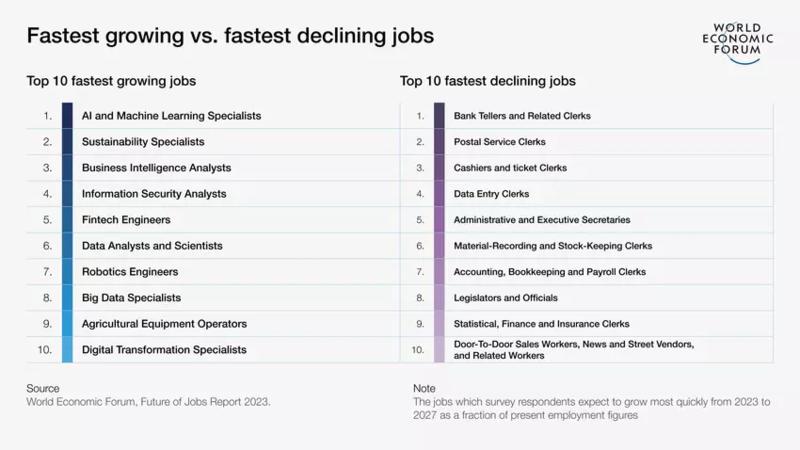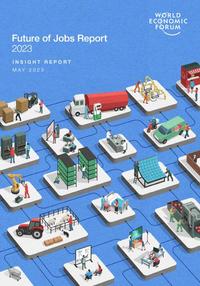The Future of Skills for Future Jobs
In the ever-evolving landscape of the global workforce, insights from trusted sources are invaluable. The World Economic Forum's Future of Jobs Report 2023 updated their comprehensive overview of the 26 attitudes and skills that drive personal and organisational effectiveness. Here, we compare the insights of this research with the Careers Service’s Employability Skills frame.
The World Economic Forum (WEF) research draws insights from over 800 companies globally about both their current requirements for an effective workforce and their predictions for 2027. It is a truly global perspective: all regions; all sectors; and every level of the organisation from school leavers to the boardroom. It also projects the anticipated shift in the relative importance of the 26 factors in the 5 years to 2027, providing a roadmap for policymakers and employers. It’s also useful for the Careers Service and offers important insights for the individual too.
The Careers Service’s employability skills framework
The Oxford University Careers Service emphasises the central importance of eight key employability skills:
These skills serve as both the foundation stones and the supporting pillars for the working world, regardless of the sector or job function. We choose to present them without a ranking or priority, as this will differ significantly for different roles, however, most will be included in the essential and desirable attributes sought for the vast majority of graduate level employment, and for more senior roles.
The hierarchy of skills within the WEF research (below) provides significant support for the continuing importance of many core attributes within the OUCS Employability Skills.
WEF top 10 attributes and skills
|
2023 |
2027 |
||
|---|---|---|---|
|
|
Infographics
Visual representations of key data from the World Economic Forum's Future of Jobs Report 2023
The higher level cognitive skills of Analytical Thinking (included in Initiative in our framework) and Creative Thinking continue to top the list in 2023 and 2027. Six other elements keep a place in the WEF Top 10 for 2027, five of which reflect ATTITUDES rather than SKILLS/KNOWLEDGE. These five attitudes underpin how well we manage ourselves and our commitment to remaining curious and continuing to learn (self-management), and how effectively we work with others (communication, teamwork, leadership).

On a global scale, therefore, the WEF report provides a comparative snapshot of the global skills framework. The most important shift we see is the rapid and significant increase in the importance of Technology Skills, with ’AI and Big Data’ and ‘Design and UX’ joining ‘Technological literacy’ all in the Top 10 for 2027. We can anticipate this set of technical skills and knowledge being increasingly important in the careers of many of our graduates and it is certainly an encouraging landscape for students with an interest and ability in these tools.
However, there are two caveats we’d like to emphasise about this predicted shift in the skills needed on the ‘global stage’ – all regions, all sectors, all levels of work.
Firstly, there is already a mismatch in supply-and-demand for the many technology skills, and this is likely to widen. Policy and education will shift to increase ‘supply’, but we can also expect companies to respond
- (i) paying more for the skills to attract and retain talent and
- (ii) training their people to build the skills base they need.
In this later situation, recruitment will focus on motivation, interest, and potential.
Secondly, the drive for technological skills will not apply universally and there will always be enormous range of alternative opportunities. It is quite evident that Big Data; UX design; Cyber security expertise are specific fields of knowledge and application, and these will be significant for very many organisations, but will only rarely be the frontline skills that underpin the business model.
Key takeaway
One key takeaway is the recognition that a degree alone is rarely sufficient to be a strong candidate for the modern workplace. While academic pursuits can provide a solid foundation for some skills and (quite often) essential knowledge, it is valuable to supplement this with real-world experience and exposure. The Careers Service supports students through our information sessions, employability skills programmes, and the hands-on experiential learning from our Summer Internship programme and termly Micro-Internship Programme. Students’ extracurricular activities, societies involvement, volunteering and personal projects can all help to develop, cultivate, and enhance a more diverse skill set.
Recommendation
We recommend that students prioritise their time and tailor their skills development journey. Be led by your core interests as much as future career aspirations. Pursue extracurricular activities because you find them engaging and intrinsically motivating – because you want to do them. It will be easier to sustain your engagement and you will develop your strengths and some of the core employability skills as a natural by-product. Where you have a clear career focus, you can of course also choose to focus attention on this, seeking relevant work experience to test your thinking and build core competencies, and helping to position yourself more deliberately in a competitive job market.
Conclusion
The Future of Jobs Report serves as a reminder of the importance to continue to cultivate your curiosity and instinctive drive for learning and growth. While the landscape may shift, the fundamentals of adaptability, critical thinking, creativity, and strong communication skills remain paramount, and will provide the basis for a successful future, whether this is by building expertise and mastery in a specific area or navigating successfully across a variety of roles and sectors. Keep a watchful eye on the emerging skills and industry trends, but in a rapidly changing world, agility, resilience, and the capacity to flex and grow remains a core competency for future success. These are attributes that underpin the success of a great number of students at Oxford.
Interested to learn more?
Sign up for our upcoming session:

Essential Skills for the Future: What organisations want and how to develop them as a student
Tuesday 20 February, 12:30-13:30, Online
We will review the insights from the World Economic Forum Future of Jobs Report 2023 and explore how you can use these insights to align with the emerging economic environment. During the workshop, you will have the opportunity to reframe your thinking around which skills to prioritise for development, begin to build a personal development plan, and gain relevant experience that demonstrates the core attitudes and strengths needed for stronger applications, whether for further study, internships, or full-time positions. We look forward to seeing you there!





